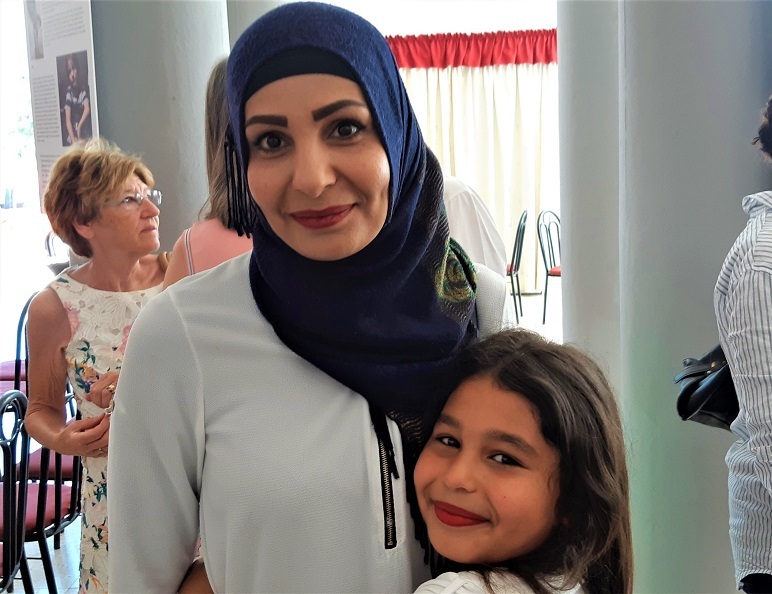By Bejay Browne.
Refugees and asylum seekers in Paphos are appealing to the local community for acceptance, visibility and support.
They want to be able to work in jobs and be accepted, whatever their nationality or religion, something which they said, is not currently happening.
The comments were made at the open day of Caritas and the Learning Refuge, held in Paphos in June.
A spokesperson for the event said that all attending felt moved and privileged to hear the experiences from the refugees and discover how life can be for some in Cyprus.
A number of refugees and domestic workers living in Paphos shared their stories and experiences with the attending public, in order to try to encourage a greater understanding of problems that they are facing and also to dispel any myths and misconceptions.
One of the main points raised by a number of refugee women and organisers is to encourage the employment of females wearing a hijab.
“When do we ever see a woman wearing a hijab and working in Paphos? They are not visible in shops, hotels or anywhere that they come into contact with the public. We must try to change this and give them a chance to have a proper life and be part of the community,” an organiser told the attending public.
Caritas incorporates more than 160 Catholic organisations that together to form Caritas International. Believing that they are stronger together, they aim to make a real difference to the lives of the poor and disadvantaged worldwide.
Caritas in Paphos works to support vulnerable people of every race and faith and most of their beneficiaries are refugees escaping from life-threatening situations in various countries such as, Syria, Iraq, Cameroon, Somalia and Nigeria.
Rehab Al Habrat who is originally from Syria and has lived in Paphos for years, volunteers with both the United Nations High Commission for Refugees and Caritas. She wears a hijab and has faced discrimination because of this. She told the Paphos Post that this is not an uncommon practice in Cyprus.
“A lady with a hijab is not generally accepted and its difficult for us. We want to have a normal job like every women, and we can only do that if we take off our hijab, we’re told.”
She added that even if a Muslim woman applying for a job speaks both English and Greek and meets all of the criteria, they are still not employed because their heads are covered.
“Employers say if you want the job, take your hijab off and you will get it, and that’s not fair for us. They don’t respect us so we don’t get the job” she said.
Naziha (her name has been changed) a young mum from Syria has been in Paphos for 18 months and is desperate to find a job but has faced a barrage of discrimination as she wears a hijab. Naziha speaks English fluently and aspires to finish her education in Cyprus. She fled to Cyprus as it became too dangerous for her to continue to live and study in Syria.
“I was studying micro biology in one of the most amazing universities in Syria, but the last semester was very difficult as many bombs were dropped near my home. My dad told me, you are not going to be a victim here, you will be a fighter and find a better life out of here,” she tearfully told the gathered crowd.
“I want to find a job, I’m young and I can do anything, and work anywhere to feel that I can help myself. But everywhere that I go, I am treated in a bad way and am looked at strangely.”
One of her worst experiences involves a local shop. Naziha was told that she had a job, they wanted an English speaker and she turned up for work. When the female store manager saw her, she was immediately and rudely rejected.
“She looked at me in a bad way and said, ‘Sorry, we don’t want you here with us, your look is not so……….Also, you also have to go and learn our language, you are not here on holiday and then you can come and try to work with us.” Naziha left in floods of tears.
“They want you to be nothing, its very hard to deal with. I didn’t come here just to be at home and do nothing and deprive my mind. I’m not like that and I don’t want to be like that. I want to try to find a job and learn Greek, just to make them know that I can learn the language.”
Refugee children are also often bullied in school.
Al Habrat said local children can show kindness and help these young kids to learn and grow.
“They only know the war, they know how to fight to get food, how to fight to get water and gas, so what do you expect from this child.”
She stressed that compassion, understanding and friendship is the way forward.
“There are also a lot of good people here too that are doing many things to help. We are very grateful for that.”






